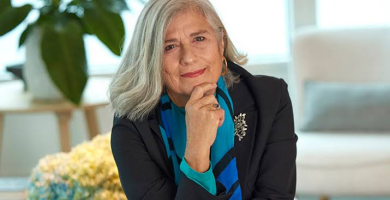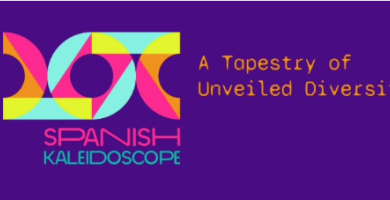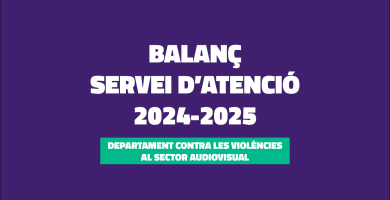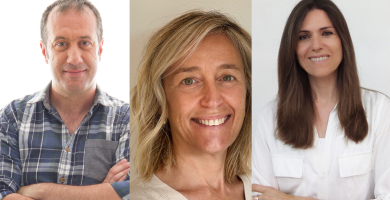
ECHAR A RODAR: "On starting a shoot, it’s increasingly normal for productions to directly seek or select different consultancies to be in charge of sustainability."
This month we interviewed Julio Blas, director and sustainability consultant at Echar a Rodar; Anna Corbella, sustainability and CSR consultant at Echar a Rodar and Elisabeth Lozano, director and sustainability consultant at Circulav. Echar a Rodar is opening an office in Catalonia, focusing on sustainable audiovisual production. We asked them to explain their work to us.

What is Echar a Rodar and how did the idea for its creation arise?
Julio Blas: The company was created in 2018 from an idea I had, because I was offered the opportunity of giving a sustainable communication class on a master’s degree of OBS Business School with the University of Barcelona: classes in marketing, sustainability and communication. I’ve studied and worked mainly in television audiovisual for more than 25 years. And I saw that nothing was being done on this in film, audiovisual and series. So I started to investigate, and I found something, but I said: “well, let’s get started then”. We started to find out about the seals that existed, the possibilities, and then the first jobs began to appear. We were just starting out as well, because sustainability is so recent that it’s sometimes difficult for us to make progress, and we need to investigate, implement and do things in accordance with how things develop. Because this started when, in 2021, the ICAA proposed that to obtain subsidies the projects should have sustainability criteria. And, a couple of years later, Eli contacted me saying that she was interested in doing training, that she was in the Huelva area and wanted to know whether we could have a corporate link. And now we’ve added Anna.
Anna Corbella: I joined the Echar a Rodar team recently. I arrived here in Catalonia one month ago. They were also looking for someone in Catalonia who could lend them a hand. Eli is based in Huelva and Julio in Madrid and, therefore, I’ve started knocking on doors in Catalonia to present the great work that they were already doing throughout Spain. We’re trying to do networking in Catalonia as well.
Julio: Anna was one of my students. I thought she was an exceptional student and I had the opportunity to be the tutor for her master’s degree final project, apart from teaching them a module on sustainable communication and green marketing. I proposed it to her and she’s joined us. I started, then Eli joined to cover Andalusia. And we thought that Barcelona was a good place to have a presence as it’s one of the most important sites on the national scene.
What services do you offer?
Elisabeth Lozano: In general, two services: one for consulting and the other for training. One more technical part: sustainability plan, carbon footprint… And, on the other hand, I offer specialized training in sustainability. We both come from the audiovisual world so our concept of audiovisual together with sustainability is quite appropriate, in relation to what a production involves and what a team may encounter when it confronts what’s new in sustainability, taking all the characteristics of the production itself into account, the time specifications, all those things that we already know will occur. The training is both online and face-to-face and, above all, is related to the subject of the eco-manager and sustainable production. In Circulav we offer a specific module on sustainable locations which we believe is an important point when it comes to reducing a production’s environmental impact.
Julio: Yes, the model that Eli’s prepared is interesting, as part of all the sustainability and eco-manager training in which we teach how to prepare sustainability plans and also to calculate the carbon footprint. There’s one part which is how to choose locations that have these sustainability criteria, what you need to take into account when you go on those first incursions into locations and what else you can take into account. And now we also have links with vocational training. A module on sustainability is going to be introduced next year on all vocational training cycles and levels and we’ve also begun to give talks in Valencia, for example. This is also now an interesting point on a training level.
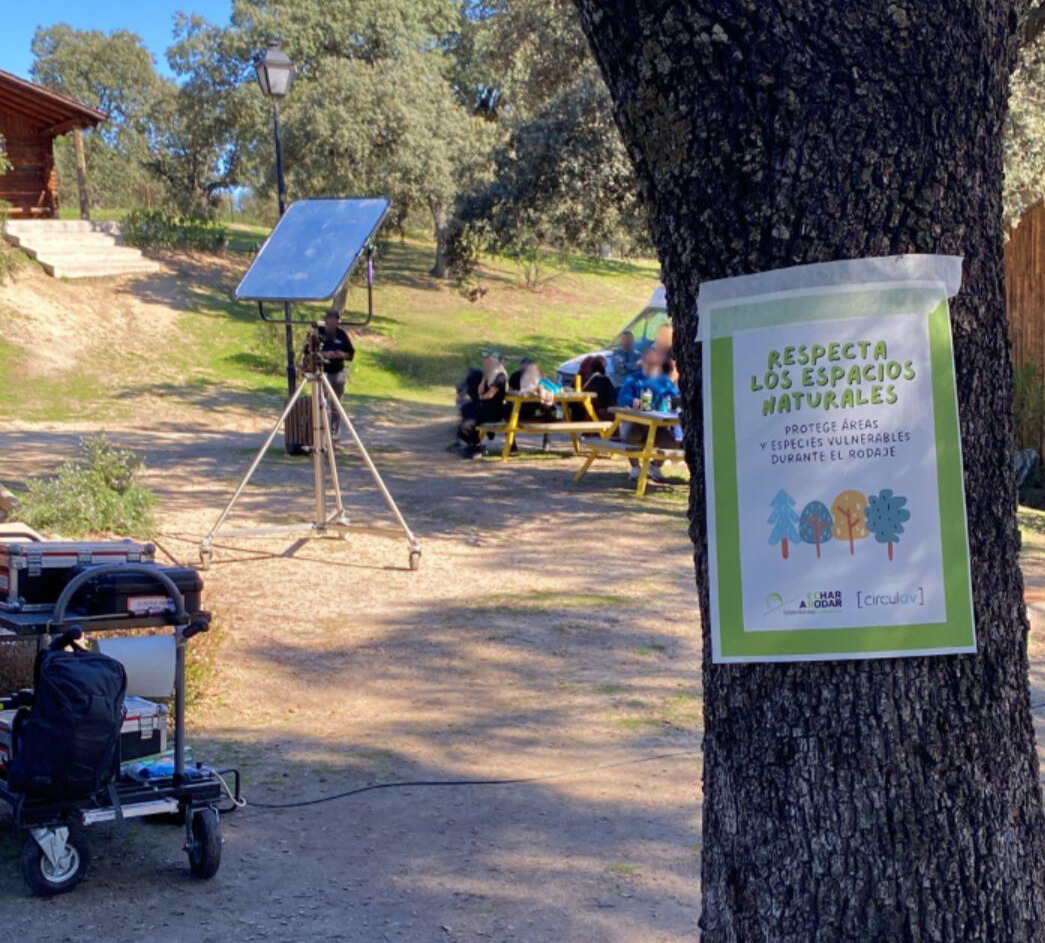
Who are these training courses intended for? Students or professionals who are already working in audiovisual?
Julio: There are two profiles. On the one hand, the audiovisual professional. There are two types of people, those who like audiovisual production and those who, apart from having undertaken training in audiovisual, are also sensitive to environmental or social issues and sustainability. They are audiovisual professionals who want to train and learn this new profession. And, on the other hand, we also have environmentalists who’ve clearly seen how sustainability measures can be implemented in shoots and they’re also interested in expanding their training possibilities in this sector.
On your website you mention that you also help productions to obtain certificates, such as ISO 9001 on quality management and ISO 14001 on environmental management. What is this process like?
Julio: In the end, the ISO quality standards are protocols that involve a certain way of doing things. On introducing ISOs what you do is to see which processes these companies are already using, introduce those that they’re not and which are established by the different ISOs, and with all this they can then undergo the corresponding audit to obtain certification. These two ISO standards in particular, on quality management and environmental management, normally tend to be strongly based on documentation. You need to have documented processes, a study of the company’s risks, a study of stakeholders to see how you influence them, your activities, how you manage communications, … And it’s all according to protocols, well-established in the form of protocols. You have to have a document which tells you how you’re going to compile this documentation, where you’re going to file it, what you have to do, … On the environmental level, for example, you also have to have measures to calculate the carbon footprint, training initiatives for the activity or the employee. These are all the activities that we collect from the company to be able to establish their fulfilment of the ISO and thus give them the certifications. It’s true that - and this is also one of the reasons why we’re here - in the audiovisual sector there aren’t many companies which have this type of certification, except for the biggest ones. I think that this is something that’s going to come.
Have you thought about helping to obtain other types of certification in the future?
Anna: Yes. We’ve worked with all the seals that exist and we’re starting out with ISO 20121 on events sustainability. Renaturalization, conservation, reforestation and offsetting your carbon footprint. And we’ve begun to offer the preparation of sustainable reports.
Julio: It’s true that the whole subject of reports on financial and sustainability information is also arriving in view of the different European regulations, and we believe that this is also interesting. And we’ve chosen events, because in the end it’s the form of production. We want to focus on the cultural industry; we believe that both events and theatre or music have similar forms of producing. In the end, we set up the event, the shoot or the play, we take the materials there, we carry it out and then we dismantle it.
Anna: I’m even doing a little market research here in Catalonia and many music festivals, for example, don’t know anything about this aspect. They’re not doing anything. The sponsors are obliging them to have these sustainable principles in an adequate manner and they need this support, which is what we’re trying to introduce. On a training level, we support them in these processes which can be complex and which possibly need external help because the structure of their organizations isn’t at all prepared for this.
Returning to shoots, to what extent do you think that this type of consultancy is necessary to improve audiovisual shoots? Unlike what you were saying about festivals, do you think that the audiovisual sector is more aware and adapted or haven’t we reached that level yet?
Elisabeth: They’re gradually adapting because changes are occurring as regards subsidies. In some way, this obligation also means that they start out on this path. That’s why, on starting a shoot, it’s increasingly normal for them to directly seek or select different consultancies to be in charge of sustainability. And many of these people, from production and even from the shoot itself, already know, already have eco-manager concepts and know how to manage a sustainable shoot.
Julio: Although it’s true that they’re changing a little because of the legislative side. They start to do it when the legislative pressure begins to increase.
One of the productions with which you have worked was La Mesías for Movistar+ which shot briefly in Barcelona. What was your work in this award-winning series?
Julio: The sustainability process of La Mesías was as follows. First, the production company contacted us and sent us the requirements. That’s important. There are productions which, depending on the platform, have certain requirements. A production for Amazon isn’t the same as one for Netflix, for the ICAA, for television or for whichever platform is distributing it.
In this case it was for Movistar, so they presented us with the sustainability needs and the criteria that we had to fulfil and they assigned someone to us from the team of Suma Content, which is the production company, who would carry out the eco-manager tasks on the shoot. We supported them, both preparing the whole plan, constantly monitoring all the carbon footprint data, and dealing with queries.
La Mesías was a tough shoot. It was our first production, and it was a shoot that lasted more than six months in two blocks with ever such a lot of locations and a great deal of data. And there was also a certain lack of experience as regards the production company, Movistar and us. It was complicated. So much so that it was necessary to audit the carbon footprint. And we managed. This was a success, but it was also a learning process. It was also complicated because of the suppliers and the timeframe. We already know that audiovisual has time constraints and it was very complicated, above all, to obtain the data.
I’m not just going to talk about that part. I’d also like to mention the positive part, which was the subject of sustainability actions. These actions which we do to reduce our possible impacts: various sources of emissions, reducing transport, reducing water use, catering and other things. And also obtaining data through the carbon footprint. It’s true that, as regards actions, the series was very successful because the whole team was highly committed right from the beginning. One of the measures that we always try to implement, because we’re highly aware of this issue, is food waste. We got the catering company to reduce the size of the food portions, as it was better for the people to ask for more if they wanted or to be able to take it with them at the end of the day rather than having a bigger portion which ends up in the bin. Another of the measures was to remove almost all single-use containers, cutlery, glasses and dishes. They used traditional dishes, aluminium bottles, … We think that it was very interesting, positive and a learning experience as regards actions.
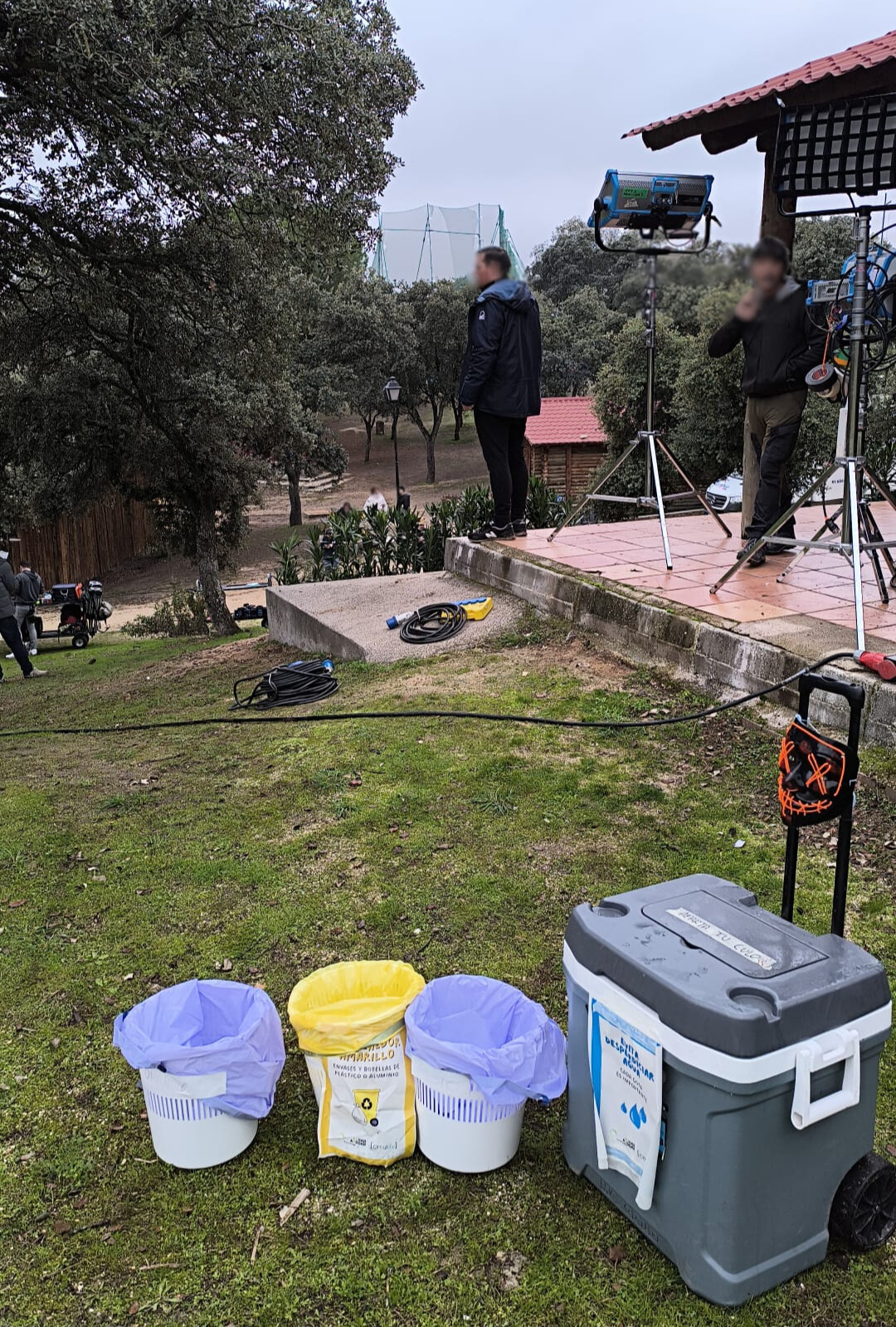
What is the greatest difficulty that you have encountered on trying to apply sustainability measures on a shoot? In general, is there anything that it is really most difficult for people to accept, become aware of or which is difficult to apply?
Julio: The situation is gradually improving. It’s true that they’re increasingly aware and that the processes are now a little more automated. We still have problems to obtain certain carbon footprint data, certain data from the suppliers or what we call the verification or official approval of suppliers. This involves renting accommodation and checking whether they have an ISO on labelling or whether they’ve implemented any sustainability measure that they can certify to you. You need to face all of this.
Another of the problems that we encounter is when we join a project that’s already at an advanced stage. That’s complicated. And there’s another matter, which isn’t even that bad, as in the last two projects we were able to do it, which is checking the script - being able to have the script to review it from the point of view of sustainability. The script is complicated; it’s very sensitive, it’s the raw material of the audiovisual. You can’t change its essence, but you can propose certain matters, small details in the scenography, small phrases or gestures. I always give the same example. One gesture can be that in a sequence about a meal, when they throw out the rubbish, they use at least two containers. This is a detail which might not change the narrative or the diegesis, but which provides what we believe to be important communication.
Elisabeth: Including this type of message helps make these gestures normal, since you see them on the screen and you gradually acquire them and, in the end, the audience also acquires them in a very simple manner.
Julio: One of the main difficulties is also to know what we can use. There are now companies which ask for an American seal. The protocol is Green Production and the seal is EMA. Then there’s Albert, the British seal, which other companies also ask you for, or the ISOs that they ask you for. Then, for example, I know that in the Barcelona Film Commission you have a set of good practices, Asturias has its own, and so has Zaragoza. Some private companies have their own. Another is the green seal of the Spanish Film Academy. There are numerous regulations and protocols, certifications…
Anna: And each autonomous community works with its own regulations.
Julio: And then there are the subsidies and financial aid. Some ask for the footprint, others don’t, some ask for a plan, some give you two points, some just tell you to present a declaration of intentions, each autonomous community, each council, …
Elisabeth: There’s no uniformity, or a single way of doing things. There are several, and the number keeps increasing.
Julio: But it will come, it will have to come.





